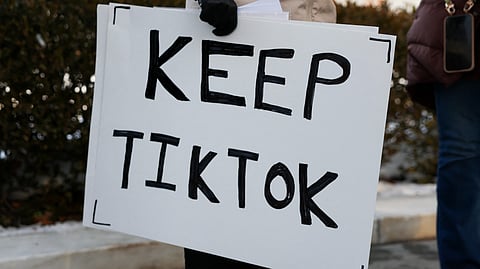
- NEWS
- the EDIT
- COMMENTARY
- BUSINESS
- LIFE
- SHOW
- ACTION
- GLOBAL GOALS
- SNAPS
- DYARYO TIRADA
- MORE

The fate of TikTok in the United States has taken center stage as legal, political, and financial forces converge. On one side, the U.S. Supreme Court is deliberating the legality of a law requiring TikTok’s parent company, ByteDance, to divest from the platform or face a nationwide ban. On the other, potential buyers scramble to position themselves for a possible sale, highlighting the app’s immense value and influence.
On Friday, the Supreme Court appeared inclined to uphold the Protecting Americans from Foreign Adversary Controlled Applications Act, a law signed by President Joe Biden in April 2024. The legislation demands that ByteDance either sell TikTok’s U.S. operations or shut down the platform entirely by January 19, 2025.
The U.S. government argues that TikTok’s Chinese ownership poses a significant national security threat, alleging that Beijing could exploit the app to collect data, spread propaganda, or even recruit spies. "The Chinese government could weaponize TikTok at any time to harm the United States," Solicitor General Elizabeth Prelogar warned during oral arguments.
TikTok’s lawyer, Noel Francisco, countered that the law violates First Amendment protections, emphasizing that TikTok is a platform for free expression. However, several justices raised concerns about TikTok’s ownership, with Justice Samuel Alito noting, "There’s a good reason for saying that a foreign government, particularly an adversary, does not have free speech rights in the United States."
If ByteDance fails to comply, TikTok’s U.S. operations could effectively go dark. Justice Amy Coney Barrett clarified that the law requires ByteDance to divest, not shut down TikTok outright, emphasizing that compliance is key.
While legal proceedings unfold, the question of who could afford to buy TikTok looms large. ByteDance has expressed reluctance to sell the platform, and the Chinese government has signaled it may block any sale involving TikTok’s proprietary algorithm—the cornerstone of its global success.
Even without the algorithm, TikTok remains a lucrative asset. Analysts estimate the app’s U.S. operations could be worth around $20 billion, comparable to Snap Inc. However, acquiring TikTok would require significant financial backing, likely from a combination of private equity firms and corporate giants.
Billionaire Frank McCourt, former owner of the Los Angeles Dodgers, has emerged as a prominent contender. McCourt’s proposal, backed by private equity funds and high-net-worth investors, includes plans to prioritize data privacy and safety. "We look forward to working with ByteDance, President-elect Trump, and the incoming administration to get this deal done," McCourt said in a statement.
This isn’t the first time TikTok has faced scrutiny. During Donald Trump’s first term as president, ByteDance nearly struck a deal with Oracle and Walmart to address similar national security concerns. Oracle continues to host TikTok’s U.S. data, potentially positioning itself as a player in future negotiations.
Meanwhile, President-elect Trump has taken an unexpected stance, advocating for a political resolution rather than an outright ban. His lawyer, John Sauer, filed a brief urging the Supreme Court to pause the law, allowing the incoming administration to explore alternatives.
With the January 19 deadline approaching, TikTok’s future remains uncertain. The Supreme Court’s decision could set a precedent for how the U.S. handles foreign-owned technology platforms, while the financial intricacies of a potential sale add another layer of complexity.
As national security concerns clash with free speech arguments, the stakes are high for ByteDance, potential buyers, and TikTok’s 170 million American users. Whether through divestment, a political compromise, or an outright ban, the outcome will likely shape the future of social media and U.S.-China tech relations for years to come.
